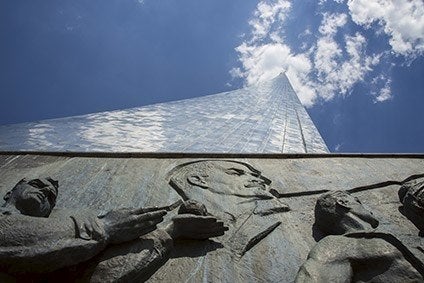
Russia recently extended its ban on various food imports from Western countries including the US and EU. The move provides Russian food makers with an opportunity to gain market share but it also presents those operating in the market with a number of challenges, such as securing supply of raw materials. Sam Skove reports.
Russia’s ban on imports of many food products from EU, US Australian, Norwegian and Canadian exporters has proven a boon to domestic food manufacturers, allowing them to snap up market share and boost sales in a happy mix of geopolitics and agricultural policy.

Discover B2B Marketing That Performs
Combine business intelligence and editorial excellence to reach engaged professionals across 36 leading media platforms.
First introduced in August of last year, the ban targets imports of beef, pork, chicken, fish, cheese, milk and milk products, fruit and vegetables from countries sanctioning Moscow over its role in the Ukraine crisis. The embargo was meant to stay in place for just a year. But now, following the European Union’s decision to extend sanctions by six months last month, Russia, in a show of bravado, has announced it will extend its sanctions by a year.
The ban has proven at least partly successful in boosting domestic output, especially in the meat and dairy industries.
In the first quarter of this year, year-on-year, Russian cheese and cheese product production rose 31%, chicken production rose 13% and meat 12% year-on-year, according to the Russian Federal State Statistics Service (Rosstat).
Food imports, meanwhile, have fallen steeply – some 43% in the first three months of the year, according to the Russian Presidential Academy of National Economy and Public Administration (RANEPA).

US Tariffs are shifting - will you react or anticipate?
Don’t let policy changes catch you off guard. Stay proactive with real-time data and expert analysis.
By GlobalDataOf course, the ban’s impact has been compounded by the ruble’s devaluation – which has dropped by 40% to the US dollar since the beginning of 2014. This has made what imports that get through the restrictions more expensive, noted Natalya Shagaida, director of the Centre for Agrofood Policy at RANEPA (the Russian Presidential Academy of National Economy and Public Administration). But even factoring in the exchange rate, meat production is a standout achievement of the ban, according to Shagaida. "When it comes to meat, imported products have in general been replaced by our own products," Shagaida wrote in a RANEPA publication in May.
Top meat producer Cherkizovo Group, a publicly traded company, has certainly grown profits on the back of the embargo. Its meat processing division saw sales rise 28% and its poultry sales rise 20% in the first quarter of the year compared to the same time last year, according to a company communiqué. Banks are lining up to bet on Cherkizovo’s chances: in early July, major state lender Sberbank upped the firm’s credit financing by RUB2bn (US$35.8m).
Russian dairy processors, too, have benefited. "In the short term perspective, the embargo has positively affected the market in terms of the lack of competition from European producers," said Maria Zhebit, a spokesperson for Russia’s National Dairy Producers Union (Soyuzmoloko).
Companies are also benefiting from reduced or annulled slotting fees in domestic grocery stores, RANEPA’s Shagaida said.
Still, while the embargo may be helping some companies boost sales, it has also played havoc with supply chains, leading in some cases to a rise in counterfeit goods.
Falling production and the rising price of milk imports amid the embargo have starved cheese makers of the raw supplies needed to make high quality products, and, in some cases, encouraged dubious practices. While Russia’s official figures put the volume of counterfeit cheese on the market at 5%, some categories of cheese products may have a much higher percentage of fake goods, according to Soyuzmoloko’s Zhebit.
Palm oil, a cheap milk substitute that has seen steep import rises since the ban, may be to blame, according to Zhebit: "Because there’s less raw materials and [milk] is expensive, unscrupulous manufacturers will stir in cheap palm oil," Zhebit said.
The milk industry, like many other Russian industries, also suffers from a high dependence on western technology, which has become far more expensive following the ruble’s fall.
"Seventy-to-90% of the Russian dairy industry’s production equipment is imported, unfortunately…which affects the cost of the final product," Zhebit said.
Cherkizovo has also seen manufacturing costs affected by the devaluation of the ruble, which has raised prices across the supply chain. "Many components for production are bought in Europe…and there are components that [while] made in Russia, for instance grains, have their price in dollars as export goods," said Alexander Kostikov, head of investor relations at Cherkizovo.
Despite the mixed results of the embargo, however, Russian producers are still clamouring for more items to be added to the list of banned goods.
Ahead of Russia’s recent announcement to extend the ban, producers put forth a dizzying array of items for consideration, including ice cream, tinned fish, flowers and chocolate, all with the stated aim of protecting local producers from foreign competition. Wineries on the peninsula of Crimea, whose annexation by Moscow last March first set off western sanctions on Russia, have been particularly insistent on a ban on EU and US wines.
However, agriculture minister Alexander Tkachyov said in an interview on television station Rossiya-24 last week that any further bans would only cover items Russia could easily replace as the government looks to balance a protectionist policy against the prospect of shortages on shelf.





